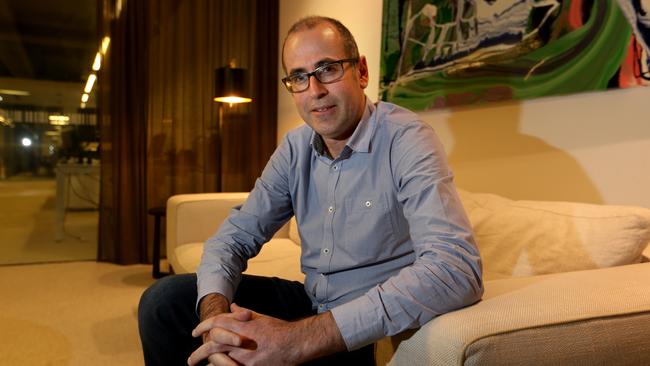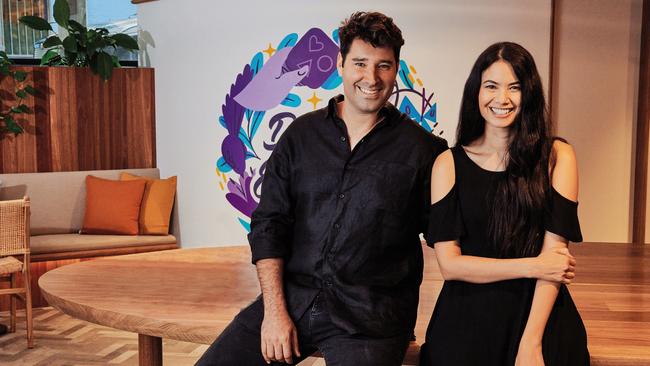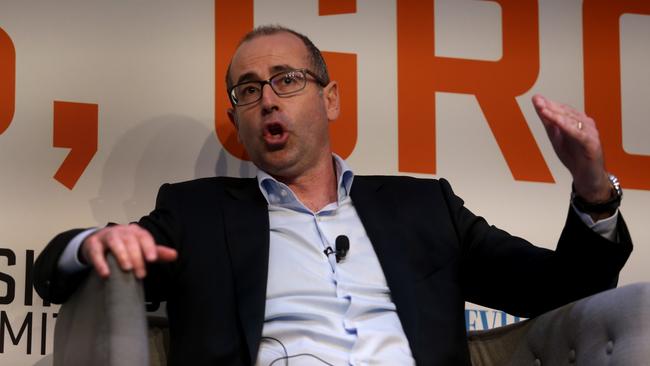Square Peg cuts Canva by 36% but Paul Bassat says local unicorns can ride out tech downturn
Paul Bassat’s Square Peg has just slashed Canva’s value. Now he says tech founders must relatively quickly find a way to continue to grow.

Venture capital giant Square Peg Capital, headed by renowned technology leader Paul Bassat, has cut its valuation of Canva by 36 per cent, joining other investors in marking down the start-up darling headed by young billionaires Melanie Perkins and Cliff Obrecht.
Square Peg, which has about $2.5bn invested in 63 tech companies in Australia and abroad, recently undertook a similar process to fellow VC firm and Canva investor Blackbird in re-rating the value of its Canva holding.
The process, completed by a big four accounting firm and taking into account several valuation methods, including comparable listed companies, examining secondary market transactions and a discounted cash flow model, resulted in about $US14.4bn ($20.7bn) being wiped from Canva’s previous record-breaking $US40bn valuation.
Mr Bassat, who co-founded Australian tech sector pioneer Seek with brother Andrew and Matt Rockman, acknowledged the Canva rerating but insisted the online graphics business was “a remarkable company” with a bright future.

The fall in Canva’s valuation is almost certain to be the first of dozens of downward moves for Australia’s tech “unicorns” which have recently achieved the much-heralded $1bn valuation mark.
Mr Bassat, a Square Peg co-founder, acknowledged it would be “disingenuous of me to say everything will go upwards” in the tech sector in the next couple of years, but insisted the local scene was relatively well placed to ride out the current storm.
“The Australian tech ecosystem has these deep roots, not that they didn’t exist previously,” he said.
“There are companies with hundreds of millions, sometimes billions, of revenue, thousands of employees, venture capitalists that have raised lots and more angel investors than ever.
“We have taken six or seven steps forward over the past five years. We’ve now taken a step back this year, no question. But I think we are well placed to cope with being buffeted by global market forces.”
Many tech firms have cut staff in recent months and rein in costs but Mr Bassat warned that founders have to find a way relatively quickly to continue their growth trajectories, which was the very essence of what an entrepreneur with solid business plans should be doing.
“We have found on the whole, founders have been very practical about what has occurred,” Mr Bassat said.

“They are positive and optimistic people by nature. You have to have self confidence and optimism. That’s what drives them to start with an idea and develop it, like an Airwallex and Canva.
“Some have had to do retrenchments and have been more focused on cost. We remind them they can’t shrink their way to greatness. The way they are creating value is by growing revenue.
“Now, they have to do that in a sustainable way but the only way they can do that is by revenue, not just shrinking their costs.”
While Square Peg continues to be a Canva shareholder, the firm is understood to have sold down some of its holdings last September when Canva raised $US200m to achieve the $US40bn ($55bn) valuation – by far the biggest in Australian start-up history.
That partial selldown came in a 2021 year when Square Peg made 17 investments, at volumes and prices that Mr Bassat admits in hindsight may have been too much and part of what Square Peg recently described in an investor letter as “cognitive dissonance”.
“The point I was trying to make was we were proactive about exiting positions and we returned quite a lot of capital (to investors) and part of that was a maturing of the portfolio where we had held some investments for six, seven or eight years and it was time to exit,” Mr Bassat said. “It was a recognition that markets were strong and we wanted to take advantage of that.

“The cognitive dissonance is that same set of facts should have led us to be more cautious when it came to new investment. I don’t look at the companies we invested in and say we lowered our bars in terms of quality, but the reality on an apples-to-apples comparison is our entry point into those companies was higher than earlier years and that has to have an impact on the long-term returns on those companies.”
Despite weakening market conditions this year, according to a source Square Peg has raised a further $US550m from investors for its Fund Four that invests in early stage Series A and B funding rounds, and its Opportunities Fund 2 for later-stage rounds for firms from its existing portfolio.
Mr Bassat would not confirm the fundraising but said sentiment from investors in Square Peg, which has returned $582m to investors over a decade from various sales and exits, has been “okay” despite falling valuations for the tech sector across 2022 after several years of spectacular growth.
“My sense is (investors have been) broadly pragmatic … and they have been supportive. A lot of investors have backed us for a long period of time, the full 10 years we have been going,” Mr Bassat said.

“They realise markets don’t go one way, and what you do see eventually is a reversion to the mean and we’re seeing that at the moment. The question is what is the mean, and our view is that early stage tech investment done well can lead to strong returns over a longer period of time. But within that, there will be periods of strong and weak returns.”
Square Peg invested in Canva in 2012 and then 2014, when the company had no revenue, taking part in $US3m and $US3.6m seed funding rounds respectively – a far cry from when it would be valued at $US40bn less than a decade later.
“Canva is really a remarkable company. It has now become an incredibly important company that has created enormous value and employs thousands of people,” Mr Bassat said.
But he admitted that Square Peg had been part of the same process as Blackbird in seeking an independent valuation of Canva, and then marking it down accordingly across several of its funds.
“We accepted that view. It is a remarkable business but it is unsurprising what has happened given what is happening in the broader market,” he said.
Mr Bassat pointed out that Square Peg was not remunerated or rewarded when its investments were marked up, and its profits were achieved on two things: the entry price into an investment and then the later exit.
But he did say there was unlikely to be many public market floats in the medium term given that “our expectation is the IPO market will be shut for a long period of time”, but that Square Peg would still like to see its portfolio companies create value through floats, trade sales and other liquidity events.
Mr Bassat added that many companies were still in relatively good cashflow positions having raised money during the boom times of 2020 and 2021, and that the market for fundraising rounds was still open for “good companies with good narratives” even if “that adjustment process in terms of valuations is certainly well and truly under way”.
One company said to be trying to raise capital at the moment – which Mr Bassat would not comment on – is online payments company Airwallex. Bloomberg recently reported that it is trying to raise up to $290m in a Series E round, but it could at least do so at its previous $7.6bn valuation achieved in November last year.
Mr Bassat harked back to his own experience at Seek as proof that start-ups needed to be patient in the current market and maintain focus on their underlying business.
“In 2000 just prior to the dotcom crash, our value as a private firm was $100m,” he said.
“The crash occurred and had we needed to raise again, it would have fallen dramatically. Three years later we were at the same $100m. In 2005 we listed (on the ASX) at $700m; by 2007 we were at $3bn and then in the middle of the GFC we were back to an $800m valuation.
“Within the organisation, nothing really changed over that time. I have no doubt a company like Canva is just focused on running their business at the moment.”







To join the conversation, please log in. Don't have an account? Register
Join the conversation, you are commenting as Logout